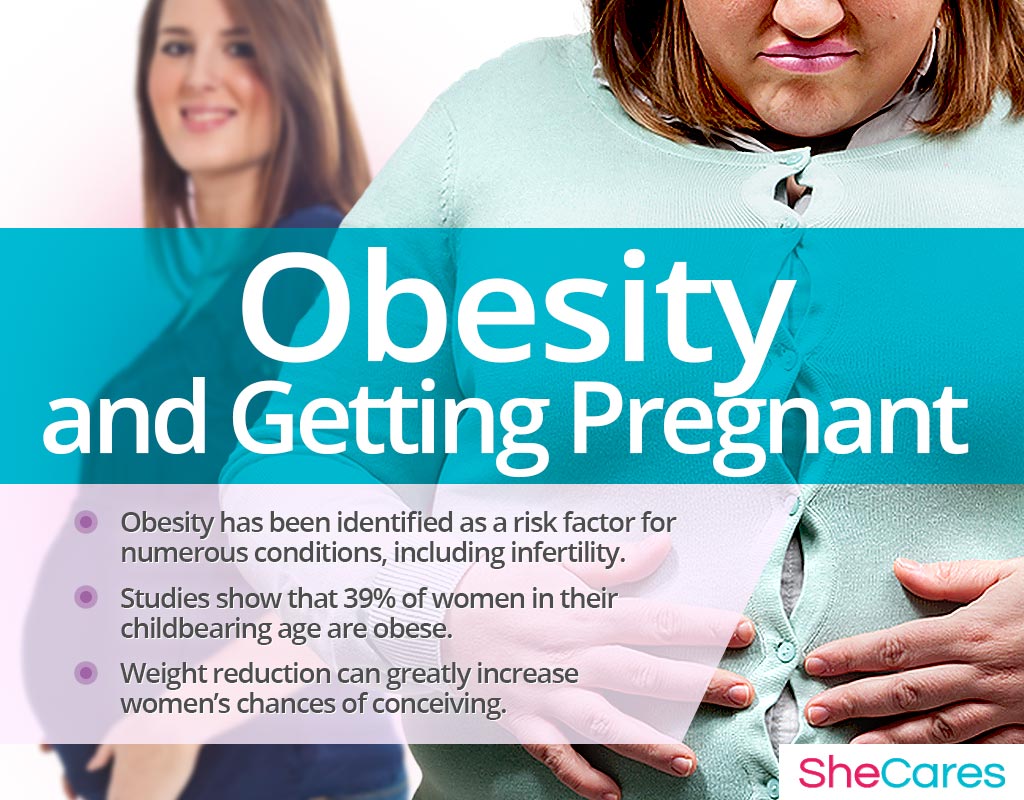Brief Overview of Obesity
The most common and useful way of defining weight is by using a Body Mass Index (BMI), which takes into consideration a woman's weight in regard to her height. This criteria describes excess body fat in two terms:
- Overweight, when a BMI falls between 25 and 29.9 kg/m2
- Obesity, defined as a BMI that is beyond 30 kg/m2
The term morbid obesity is used when a woman weighs 100 pounds more than her proper weight and has a BMI of 40 or more.
Possible Effects of Obesity and Being Overweight on Getting Pregnant
Studies have shown that maternal weight affects fertility and pregnancy. It might also extend past childbearing and affect the child's health later on in life. Although being overweight has considerate effects on conception, most of those health risks have been linked to obesity.
Effects of Obesity on Fertility
Although the exact causes are not always clear, obese women are three times more likely to suffer from infertility due to:
- Menstrual irregularities, which may occur due to obesity's effects on hormonal balance. These abnormalities can inhibit ovulation, making conception more challenging.
- Decreased egg quality that can be caused by obesity-induced insulin resistance and can lower your chances of conceiving a baby.
- Uterine implantation failure that can occur in natural pregnancies and in vitro fertilization (IVF).
Effects of Obesity on the Mother and Baby
Maternal obesity during pregnancy increases the risk of the most common complications, such as preeclampsia, gestational diabetes, or hypertension. In turn, these conditions might lead to low blood sugar or high bilirubin in babies, which can also predispose them to developing diabetes, obesity, and heart problems in the future.
Women with a BMI over 30 tend to have a longer and harder labor and give birth to larger babies, which can require a Cesarean section as well as result in shoulder dystocia and other injuries to the baby.
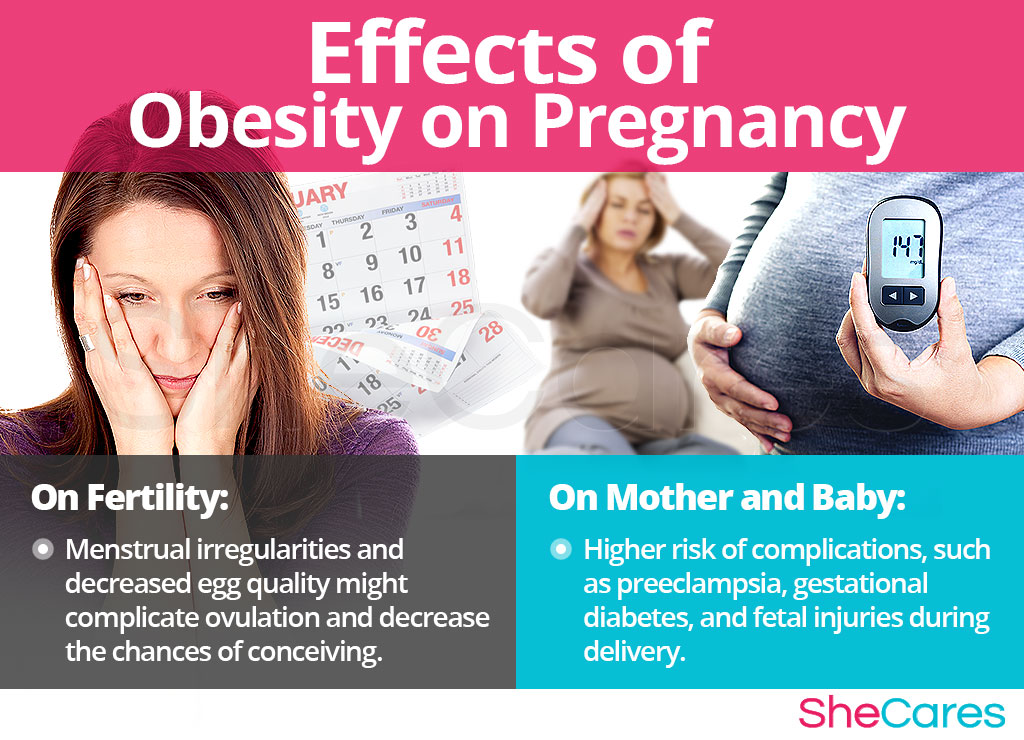
Risks and Complications
Obesity pregnancy is more likely to end in a miscarriage or stillbirth. It has also been linked to causing neural tube and heart defects in babies.
Action Plan
Control Obesity before Pregnancy
Your goal in the preconception period is to get as close to the normal BMI as possible. By losing weight prior to getting pregnant, you increase your fertility chances of conceiving and decrease the risk of future complications. To do it in a healthy, safe, and effective way, consider the following recommendations:
Healthy Diet
To lose weight, you have to eat, but the key is to know what, how much, and when to do it:
What to eat
The aim of weight loss before pregnancy is to create a diet plan with high-fiber and nutrient-rich foods from the following groups:
- Phytoestrogenic foods, like flaxseeds, tofu, and broccoli
- Whole grains, like oatmeal, quinoa, or barley
- Protein, like beans, eggs, lean meats, and low-in-mercury fish, like salmon or tilapia
- Dairy, like yogurt, milk, or cheese
- Nuts and seeds, such as walnuts or chia
- Fruits and veggies of different colors, at least half of them raw
Also, it is important to keep the following pointers in mind:
- Try to avoid foods that offer “empty calories,” such as chips or candy.
- If hunger strikes, opt for healthy snacks, such as fruits, nuts, or hummus with veggies.
- Avoid sugar-sweetened drinks and replace them with natural sweeteners, such as stevia or yacon.
- Try to drink at least eight glasses of water a day.
How much to eat
To burn fat, you need to use more calories than you consume. The idea is not to starve yourself, but to provide your body with healthy foods while increasing your exercise to speed up your metabolism.
When to eat it
Always start a day with a well-balanced breakfast, such as eggs, oatmeal, or fruits. Remember that eating small portions frequently throughout the day, instead of a few big meals, can keep you full for longer and prevent cravings.
Adequate Exercise
No weight loss program can ever bring long-term results if it is not complemented with exercise. Studies have shown that even a small weight reduction can boost fertility.
- Aim to exercise for at least 30 minutes a day five to seven days a week.
- Avoid strenuous exercise and concentrate on moderate aerobics and cardio.
- Alternate your workout with exercises that strengthen your core muscles, such as yoga and Pilates.
Good Habits
- Take prenatal vitamins, such as folic acid or iron that can increase your chances of getting pregnant and prevent birth defects.
- Hormone-regulating supplements, such as Macafem, might help you balance your hormones and regulate your menstrual cycle.
- Stay away from weight loss medications while preparing for pregnancy.
- Maintain frequent doctor check-ups to monitor your health during weight loss.
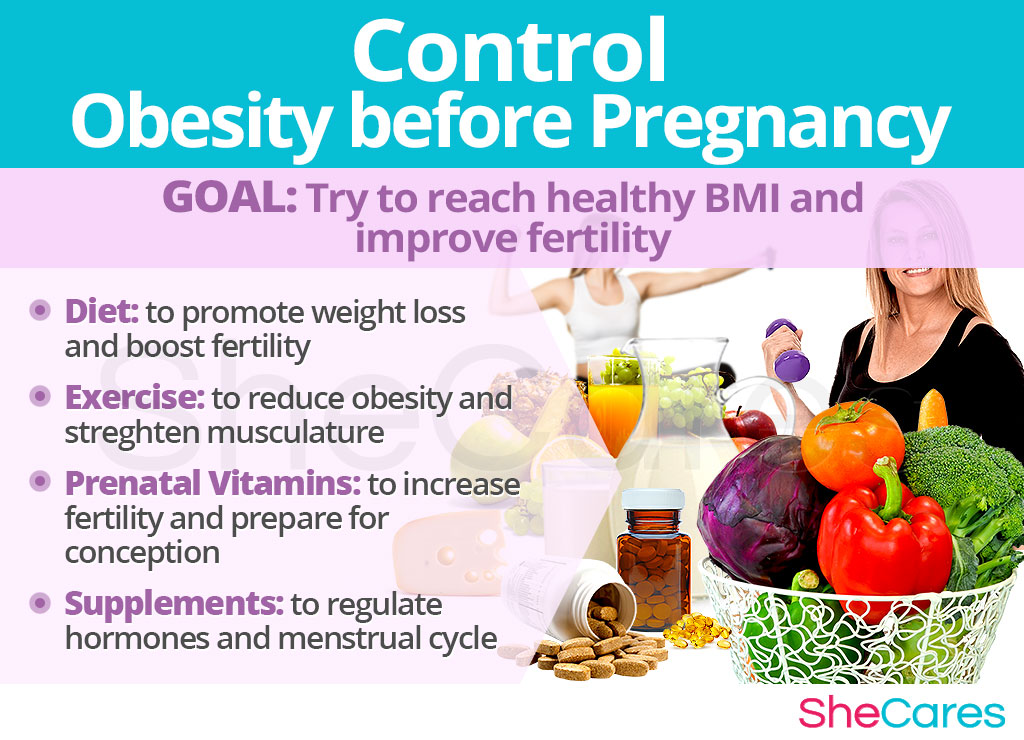
Treatment
Some women require additional help in their battle with obesity. Possible treatment options include:
Medications that work by increasing metabolism, suppressing appetite, or blocking fat absorption. They can be purchased over the counter or with prescription, but their use should always be discussed with a doctor due to numerous side effects.
Weight loss surgery, also called bariatric surgery, promotes weight loss by making changes in the digestive tract. It is reserved for women whose BMI is above 40kg/m2, or those with a BMI of 35 who also suffer from heart disease, sleep apnea, or diabetes. Read more about getting pregnant after weight loss surgery.
Tips for Conceiving with Obesity
You should have a good idea of your target safe weight for pregnancy before you attempt to conceive. For some couples, conceiving takes several ovulation cycles. So, stay patient and continue with your preconception action plan.
- Around ovulation, switch to healthy protein sources, like beans and eggs.
- Take omega-3 fish oil, which can improve blood flow to the uterus.
- Drink plenty of water to make your cervical mucus sperm-friendly.
- Find your optimal way to relax and reduce stress, whether it be meditation, massage therapy, or breathing techniques.
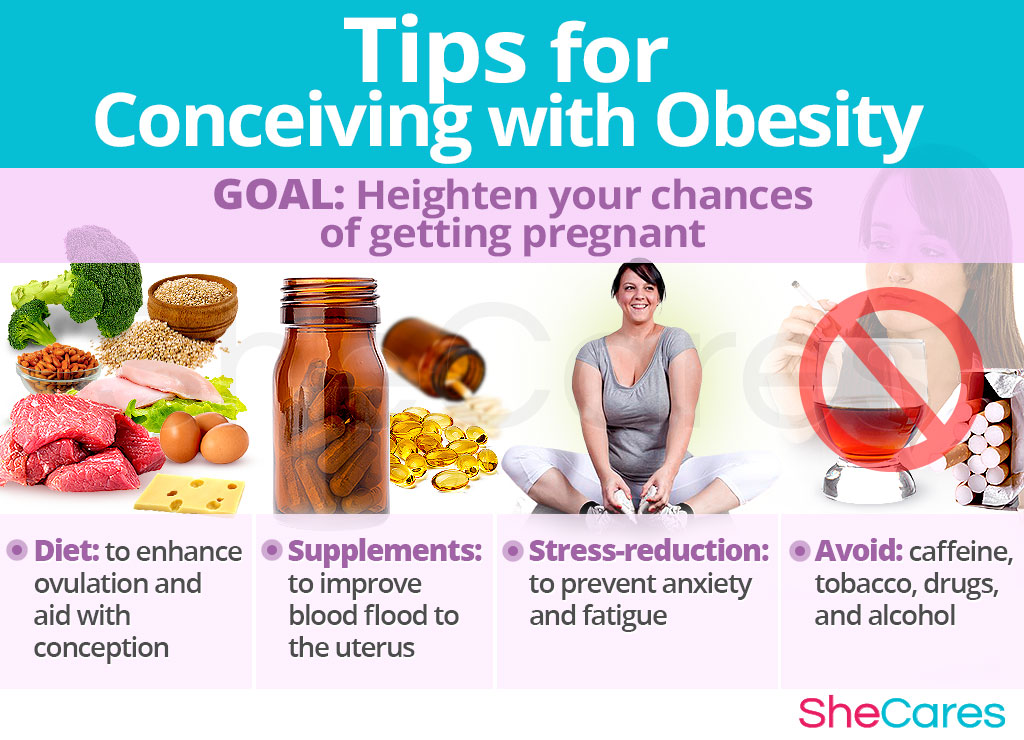
Manage Obesity during Pregnancy
Weight Loss during Pregnancy
Many pregnant obese women wonder if it is safe to lose weight during pregnancy. Despite the risks of obese pregnancy, dieting during pregnancy is not recommended by most obstetricians. Occasionally, however, small weight loss in early pregnancy does occur naturally due to morning sickness.
Weight Gain during Pregnancy
Gaining some weight during pregnancy is normal, but the goal is to gain it slowly and within the recommended range, which states that:
- Overweight women should gain 15-20 pounds.
- Obese women should gain no more than 11-20 pounds.
You can prevent obesity and being overweight in pregnancy by:
- Increasing your daily calories intake by only 300 calories in the second and third trimesters. Stay well hydrated.
- Keep up with your low-impact exercise routine, but focus on sports that are not injury-prone, for example, yoga, walking, or aqua aerobics.
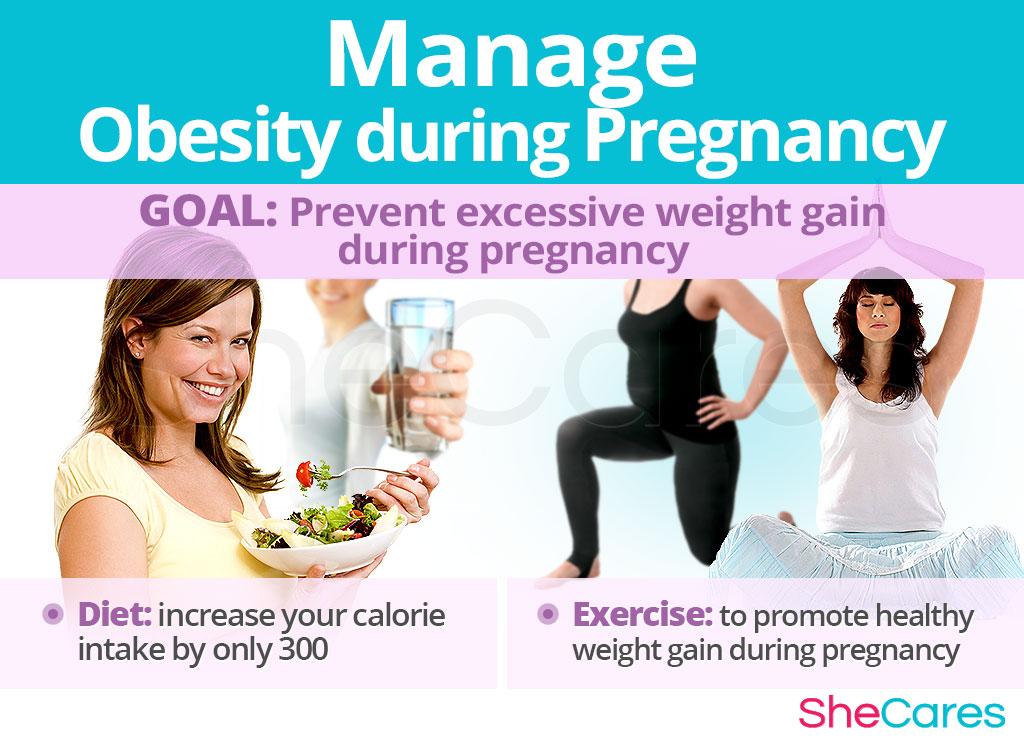
Key Takeaways
Losing weight is not easy. It takes a lot of sweat and willpower to achieve the desired goals, but committing yourself to it for the benefit of your baby might be the best motivation you can ever find. Being obese or overweight and pregnant still gives you a good chance of having a healthy baby, but by including weight loss in your pregnancy preparations along with prenatal vitamins and Macafem for improved fertility, you can fight obesity once and for all and go through your pregnancy without complications.
Sources
- Centers for Disease Control and Prevention. (2016). Weight Gain During Pregnancy. Retrieved November 15, 2017 from https://www.cdc.gov/reproductivehealth/maternalinfanthealth/pregnancy-weight-gain.htm
- Eunice Kennedy Shriver National Institute of Child Health and Human Development. (n.d.). Do obesity and overweight affect pregnancy? Retrieved November 15, 2017 from https://www.nichd.nih.gov/health/topics/obesity/conditioninfo/Pages/FAQs_pregnancy.aspx
- Geburtshilfe und Frauenheilkunde. (2015). Prevalence and Associated Risk Factors for Obesity During Pregnancy Over Time. Retrieved November 15, 2017 from https://www.ncbi.nlm.nih.gov/pmc/articles/PMC4596699/
- Harvard University. (n.d.). Prenatal and Early Life Influences. Retrieved November 15, 2017 from https://www.hsph.harvard.edu/obesity-prevention-source/obesity-causes/prenatal-postnatal-obesity/
- International Journal of Gynecology and Obstetrics. (2014). Guidelines and interventions for obesity during pregnancy. Retrieved November 15, 2017 from https://www.ncbi.nlm.nih.gov/pmc/articles/PMC4151459/
- Journal of the Turkish-German Gynecological Association. (2015). Impact of obesity on infertility in women. Retrieved November 15, 2017 from https://www.ncbi.nlm.nih.gov/pmc/articles/PMC4456969/
- National Institutes of Health. (2017). Obesity during pregnancy may lead directly to fetal overgrowth, NIG study suggests. Retrieved November 15, 2017 from https://www.nih.gov/news-events/news-releases/obesity-during-pregnancy-may-lead-directly-fetal-overgrowth-nih-study-suggests
- Mayo Clinic. (2015). Pregnancy and obesity: Know the risks. Retrieved November 15, 2017 from https://www.mayoclinic.org/healthy-lifestyle/pregnancy-week-by-week/in-depth/pregnancy-and-obesity/art-20044409
- Obstetrics and Gynecology. (2008). The Impact of Maternal Obesity on Maternal and Fetal Health. Retrieved November 15, 2017 from https://www.ncbi.nlm.nih.gov/pmc/articles/PMC2621047/
- Obstetric Medicine. (2009). Obesity in pregnancy: risks and management. Retrieved November 15, 2017 from https://www.ncbi.nlm.nih.gov/pmc/articles/PMC4989730/
- Pediatric Research. (2010). Obesity in Pregnancy: Implications for the Mother and Lifelong Health of the Child. A Consensus Statement. Retrieved November 15, 2017 from https://www.nature.com/articles/pr9201134
- The American Congress of Obstetricians and Gynecologists. (2016). Obesity and Pregnancy. Retrieved November 15, 2017 from https://www.acog.org/Patients/FAQs/Obesity-and-Pregnancy
